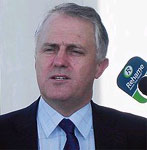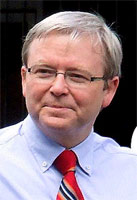Troubled emissions initiative could trigger elections in Australia
27 May 2009
The Australian government's emissions trading scheme seems to be heading for a defeat as a result of an impasse in the Senate, that could trigger a double dissolution of the current parliament.
 Leader of the Opposition, Malcolm Turnbull announced yesterday that the coalition wanted to delay a vote on the scheme until next year – after the UN climate change conference in Copenhagen.
Leader of the Opposition, Malcolm Turnbull announced yesterday that the coalition wanted to delay a vote on the scheme until next year – after the UN climate change conference in Copenhagen.
According to political observers, however, the scheme will probably be voted down in the Senate next month.
The coalition would then press for a radical remodeling of the scheme on the lines of the scheme proposed by US president, Barack Obama, which is now before Congress and is said to be far more accommodative of heavy polluters.
Turnbull said that the scheme should undergo another inquiry, this time by the Productivity Commission. However, the government has flatly rejected the call and has stuck to its commitment to put the scheme to vote in June.
A double dissolution can be called in the event of rejection of a bill by the Senate twice over a period three months apart.
A defeat of deferment of the bill next month would count as the first rejection following which the government could put up the bill again in October, and if it were to be defeated or deferred again the government would have a trigger for an election.
 Prime minister Kevin Rudd has accused Turnbull of a failure of leadership by constantly putting off a decision on whether to placate right-wing Liberals and the National Party.
Prime minister Kevin Rudd has accused Turnbull of a failure of leadership by constantly putting off a decision on whether to placate right-wing Liberals and the National Party.
"What we have here is a series of excuses to underpin the fact that the Leader of the Opposition has not had the courage to take on the climate change sceptics in his party," Rudd said.
He added that Brendon Nelson had lost the leadership of the Liberal Party for the same attitude.
Turnbull said Labor's scheme was flawed and would hit jobs. He added that there was hardly any urgent need for the legislation given that the start date had been delayed a year until 2011. Turnbull said it could wait till the Copenhagen conference concluded in December. He said the other nations would state their intentions at the conference and the US model would also be highly influential.
"For the sake of six months let's get this right. Let's not sacrifice jobs on the altar of Kevin Rudd's vanity."
According to Labour's scheme Australia would commit to cut greenhouse gases between 5 and 25 per cent below their 2000 levels by 2020.
Turnbull offered the coalition's support to the targets, for the delay. The support would give the government some bargaining power at Copenhagen. He also proposed a voluntary carbon trading scheme starting January, in which companies and individuals could start trading permits with any offsets being banked against a future emissions trading scheme.
He said that the coalition would vote against Labour's scheme in June, if the coalition's push for a deferral was defeated.
Meanwhile Senator Xenophon whose vote is crucial has refused to back the coalition's move for a deferral. He is also opposed to the scheme but would support a delay only until August till parliament returned from the winder break. He said there was enough time till then for the parties to negotiate changes.
He said he would vote against Labor's scheme in June if his deferral option was defeated. "I don't think we can justify a delay until after Copenhagen," he said.
He also did not support the coalition proposal that Australia adopt the US model as the two nations had different economies.
The prospect of an early election was discussed in the coalition party room yesterday and it was finally decided to call the government's bluff.
Meanwhile a report by the Productivity Council has put a price tag of $23.6 billion over the next five years on government programmes to tackle the climate change challenge.



















